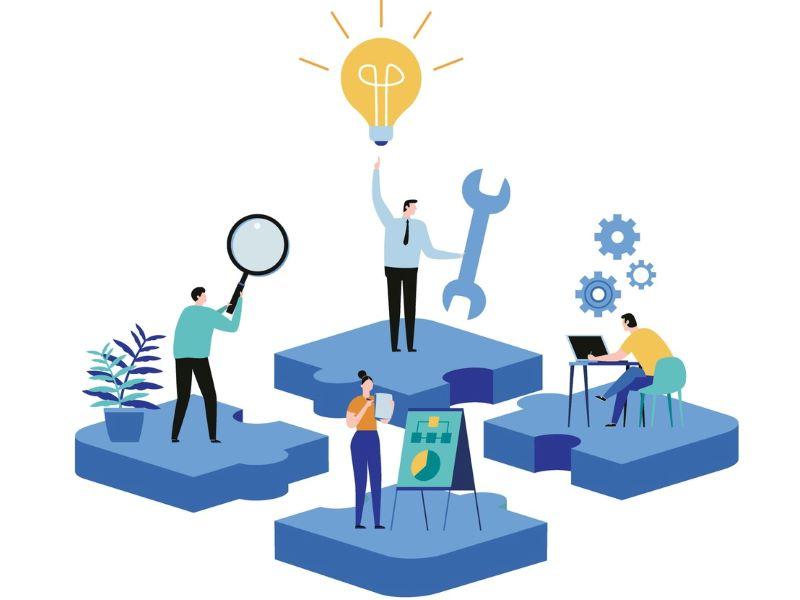The livery companies of London provide an insight into the dynamics of industrial change. The Great Twelve companies were given precedence over other companies in 1515. Top of the 16th-century heap were the mercers, who exported wool and imported fine fabrics such as silk and velvet. Today, people might struggle to define “mercer”, and the Mercers’ Company itself now focuses on its property portfolio and philanthropy.
What does this have to do with workplace skills in the 21st century?
It shows that what is of vital economic importance at one time can be irrelevant in another. That shift needn’t take hundreds of years. Thirty years ago, companies spent the bulk of their advertising costs on television, newspapers and magazines. Now, online platforms take the lion’s share.
The lesson for educators is that in the face of inevitable change in the world of employment, they need to ensure students develop the skills and cognitive abilities to take on jobs that do not yet exist, and to provide them with opportunities to (re)train for new roles now.
- Can transferable skills be taught in distance learning?
- Global learning: an emerging transferable skill for students
- Spotlight guide: Get your students workplace-ready
The development of transferable skills and cognitive ability has long been central to the value of higher education. Graduates often do not go on to a career in the area of their degree. Biologist Charles Darwin, for example, studied theology, and former UK prime minister Margaret Thatcher made her mark outside chemistry. Today, most UK graduates do not have a career directly related to their field of undergraduate study. In fact, 44 per cent work in a completely unrelated sector, with about 30 per cent in a related profession, according to YouGov research.
The implication is that this pattern will persist, so a career-focused degree is unnecessary. That would be the wrong conclusion. Accelerating economic change means universities not only have to develop job-ready attributes in their students but they must also engender awareness of the wider applicability of transferable skills. Perhaps paradoxically, this drive to meet the needs of tomorrow’s jobs does not mean a reductionist and utilitarian approach to higher education. Quite the opposite.
The added value of career-focused qualifications
The first step in preparing students for an ever-changing future is developing their career-based skills for the here and now. Many degree subjects can develop and demonstrate an individual’s intellectual horsepower, analytical skills and ability to learn and apply new information. But career-focused qualifications also need to inculcate awareness of how to use specific knowledge and skills from day one in the workplace.
The predominance, at least until recently, of graduates moving into employment outside their subject discipline area suggests employer willingness to make space for additional sector-specific training or to trust in the graduate’s ability to fill knowledge gaps themselves. Such training often requires significant investment in time and money – by both employer and employee – on top of the cost of a degree. Over the past 15 years, though, the average training spend per employee in the UK has declined nearly 30 per cent, according to 2024 figures from the Department for Education. The implication is clear: unless graduates arrive ready for the demands of the workplace, they will be disadvantaged.
Cognitive fitness, emotional intelligence and core skills
Students typically choose one subject area – say, accounting, engineering or business management – but universities also transmit core skills that every student needs to develop and maintain. These include digital literacy, numeracy, the ability to read efficiently, analytical and critical thinking, the integration and application of knowledge, and how to deal with ambiguity and complexity: the underpinnings of cognitive fitness. Just as important are “soft skills”, including communication skills, team working and emotional intelligence. Whatever degree programme a student follows, they acquire core skills that go beyond subject knowledge.
These skills’ importance for graduates is increasing. Critically, in a world that includes generative artificial intelligence, graduates need both the technical skills to manage AI agents and the soft skills to fill the gaps that computers necessarily leave. In other words, they will need to be good at being a human. The combination of technical ability and high levels of emotional intelligence is perhaps a team-level aspiration for a manager, not the requirement for every employee. Nevertheless, we should be seeking to develop both in our graduates.
Employers are focused on the “workplace attitudes and aptitudes” of potential new hires, according to a 2022 Confederation of British Industry study. They want to see “transferable skills for the world of work”. This, again, is scarcely new: employers have been concerned about the shortcomings of new graduates for decades. But the stakes – and pressures – are now higher than ever.
What steps should higher education institutions take?
Faced with this suite of challenges, what should institutions do? How can we simultaneously improve both the ability of a graduate to pick up tools now and be ready for an unknown job of the future?
The answer is, I think, within our grasp. A career-focused curriculum should embed cognitive and soft skills at its heart – supplemented by specialist technical knowledge. And in that order. It should not be seen as a didactic model of a narrow set of workplace activities. That said, workplace awareness is important – particularly direct experience offered by placements. Further, guest lecturers and workshops with practitioners give students hugely valuable insight.
None of these ideas is new but the need to review curricula to ensure we deliver real-world awareness for our graduates has never been greater.
Change through a value-for-effort lens
To deliver change, we should ask ourselves not just: “What can we do that’s new?” but also, equally importantly: “What should we stop doing?”
We should review course content through the lens of value-for-effort and ensure that we avoid repetition, duplication and the non-essential. What we absolutely should not jettison, though, is intellectual challenge – including ensuring that students look beyond the narrow constraints of their own discipline. Engineers should be exposed to philosophy, historians to calculus.
The next generation of graduates will enter a world moving more rapidly than ever before. We need to ensure we do everything we can to help them navigate the challenges they’ll face.
Aulay Mackenzie is provost of Walbrook Institute London.
If you would like advice and insight from academics and university staff delivered direct to your inbox each week, sign up for the Campus newsletter.




comment